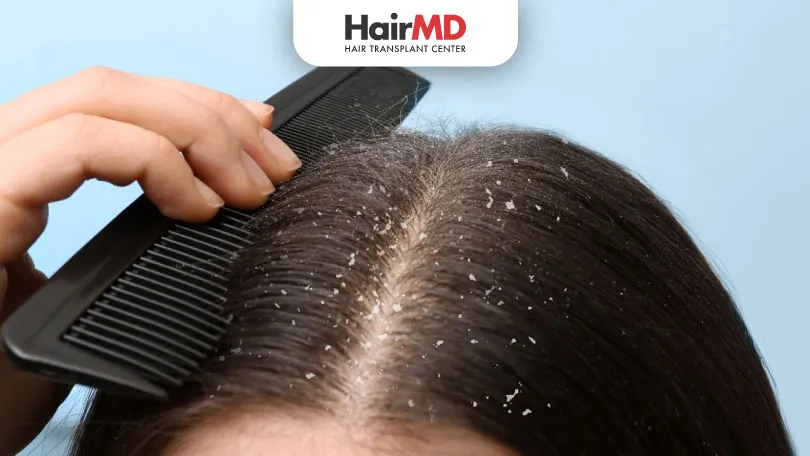22nd April, 2022

Discover the various types of dandruff, their causes, and effective treatment options to keep your scalp healthy and flake-free. Find the right solution today!
A skin condition that causes the skin of the scalp to get dry and flaky is called dandruff. In this condition of the scalp, dry skin is shed from the scalp and can be seen in the hair or fallen on the neck and shoulders. Dandruff can lead to itchiness and irritation of the skin. This condition is not harmful or contagious; however, it can lead to embarrassment and hamper one’s confidence. It is a very common scalp issue and may aggravate due to factors such as cold and dry weather and stress. What are the different types of dandruff and how to treat them? Let’s find out.
What’s covered in the article?
- Types of Dandruff and Their Treatment
- Dandruff Treatment and Home Remedies
- Conclusion
Types of Dandruff and Their Treatment
- Dry Skin Dandruff: Dryness of the skin caused by weather conditions or frequent use of hot water for hair wash leads to dry skin and dandruff. Dryness causes skin irritation and itching and the skin cells start shedding, leading to flaky dandruff. In dry skin dandruff, the flakes are small and white. Washing the hair with moisturizing an anti-dandruff shampoo or a coconut oil massage provides relief from this type of dandruff.
- Oily Skin Dandruff: When the sebaceous glands generate sebum in excess, the hair gets oily. The excess oil causes irritation of the scalp and leads to dandruff. Excess oil triggers the shedding of dead skin cells, resulting in dandruff. Stress may cause excess secretion of oil. In oily skin dandruff, the flakes of the skin appear yellow and oilier. Washing the hair with a shampoo to remove oil can help control this type of dandruff.
- Fungal Infection: Fungal Malassezia is found on the skin and scalp. The fungus thrives on excess oil, and generates oleic acid, causing the skin cells to clump together causing white flakes. In some people, it can lead to conditions like eczema. Washing the hair with an anti-fungal shampoo or application of tea tree oil on the hair can help give relief from fungus-related dandruff.
- Disease-related Dandruff: Skin conditions like psoriasis and eczema cause excess generation of skin cells, leading to scaly skin on the scalp. Combined with oil and dirt, the scaly skin results in dandruff.
- In psoriasis, the skin cells grow fast, causing thick, scaly patches on the skin. Scalp psoriasis occurs as fine flakes or as raised scaly patches. Corticosteroids or shampoo with salicylic acid or zinc pyrithione can help with psoriasis.
- Eczema leads to flaky, patchy skin and causes flakes larger than those in dry skin dandruff. A moisturizing shampoo can help reduce this type of dandruff or topical treatment may be required.
- Seborrheic dermatitis leads to redness, sores, and itchiness on the scalp. It can be considered as a severe form of oily skin dandruff and occurs more commonly in people with oily skin. It is best to take medical treatment for this type of dandruff.
Dandruff Treatment and Home Remedies
- Massaging the scalp with olive or coconut oil and application of baking soda, lemon juice, aloe vera, tea tree oil or apple cider vinegar on the scalp are touted as some of the most effective home remedies for dandruff.
- Reducing stress levels and following a proper diet and exercise routine can help you get rid of dandruff and keep your hair and skin healthy, apart from helping in maintaining overall health.
- Cleaning with a gentle shampoo or an anti-dandruff shampoo is of great help in combating dandruff. Those with oily hair should focus on shampooing and cleaning the hair while those with dry hair should focus on keeping the hair moisturized and using a good conditioner, in order to fight dandruff.
- A good hair care routine helps in controlling dandruff. Use a gentle brush or comb to remove loose skin flakes, use a medicated shampoo for hair wash and keep the hair clean and adequately moisturized.
For the correct diagnosis of the type of dandruff you have and to seek the best treatment for the same, it is advisable to consult an expert in the field. HairMD is one of the renowned hair clinics in Pune, where you can get the best service and the most reliable advice for various hair conditions. If you have dandruff, approach the expert dermatologists at HairMD. They will identify your type of dandruff, administer the best treatment, and help you attain healthy and beautiful hair.
Do You Know?
Nearly 250 Patients Visit HairMD
Everyday For Various Hair Concerns?
(You are one click away from flawless skin)
Meet Our Dermatologists
Conclusion
In conclusion, understanding the type of dandruff you’re dealing with is the first step toward finding the right treatment. Whether it’s dry scalp, seborrheic dermatitis, or fungal-related dandruff, tailored solutions can help you manage and control the condition effectively. Consult a dermatologist to get personalized advice and achieve a healthy, flake-free scalp.
Further Reading
Chronic Headaches Linked to Hair Loss?
Explore the link between chronic headaches and hair loss. Learn about causes, triggers, and effective management strategies from the experts at HairMD.
Can a Short Haircut Reduce Hair Loss?
This article explains the facts about haircuts and hair loss, including tips for hair care and effective ways to deal with hair fall.
How Much Hair Loss is Normal for Teenage Male?
Understand normal hair loss in teenage males and when it may signal an issue. Visit HairMD Pune for expert advice on teenage hair health and treatment options.
Powerful Home Remedies for Itchy Scalp
Discover Home Remedies for Itchy Scalp relief with remedies like aloe vera, tea tree oil, and apple cider vinegar. Get expert tips at HairMD!
Have thoughts? Please let us know
We are committed not only to treating you, but also educating you.











